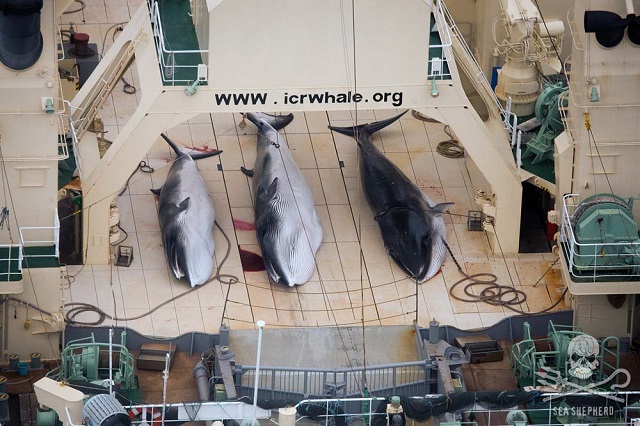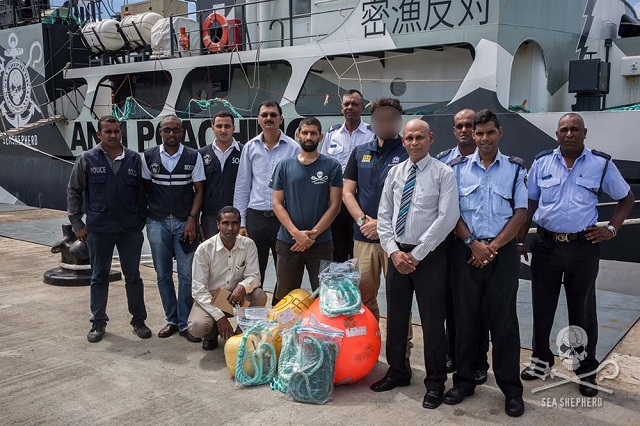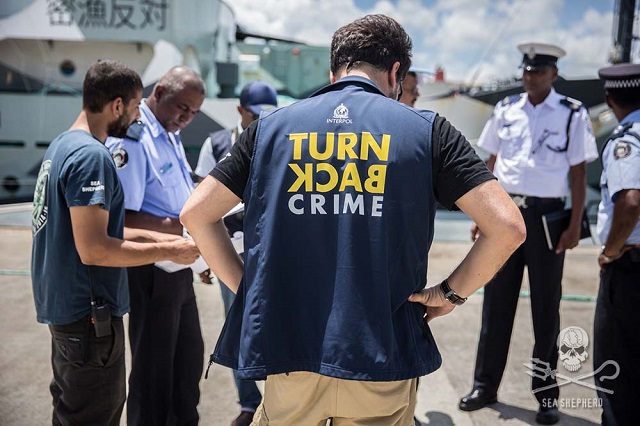Close Ports to Sea Shepherd?
Jeff Hansen, Managing Director of Sea Shepherd Australia has responded to an article in The Australian: Close ports to Sea Shepherd or risk sharing guilt for its vigilantism.
The article was written by Julia Jabour, who is a senior lecturer, Institute for Marine and Antarctic Studies, University of Tasmania (UTAS) and Anthony Bergin, a senior research fellow at the Australian National University’s National (ANU) Security College and senior analyst, Australian Strategic Policy Institute.
It was published in The Australian on November 23, 2016.
 Dead minke whales on the deck of the Japanese whaling factory ship, Nisshin Maru. Photo: Tim Watters
Dead minke whales on the deck of the Japanese whaling factory ship, Nisshin Maru. Photo: Tim Watters
Article: Sea Shepherd is again heading into dangerous territory. Last week’s announcement that its new $12 million custom-built Ocean Warrior has arrived here for a Southern Ocean incursion this summer is disturbing.
Response: What is disturbing is that there is a mentality out there in Jabour and Bergin, that think it’s totally fine to ignore Australian Federal laws, a global moratorium on commercial whaling and the International Court of Justice.
Article: Ship captain Adam Meyerson is boasting the group’s new vessel is a game changer because of its increased speed, long-range fuel tanks, helicopter landing pad and 20,000 litres-per-minute water cannon.
Response: This vessel was funded by the generosity of the Dutch postcode lottery, showing that not only do the majority of Australians oppose whaling by Japan in the Southern Ocean, but also a great many people globally.
Article: Sea Shepherd is once more aiming to engage in close combat with the Japanese research fleet. That puts this group in the category of an environmental non-state combatant. It’s in an international area engaged in the use of force, with actions close to vigilantism. It enjoys the reputation of piracy, but for quasi public rather than private ends. The International Court of Justice judgment in the whaling case two years ago was a hollow victory for environmental activists. The court didn’t rule that what the Japanese were doing was commercial whaling. Nor did it say that issuing permits to take whales by lethal means for scientific research was illegal. This left open the option of a new Japanese scientific whaling program.
Response: Japan's new scientific program has been knocked back by the International Whaling Commission. In Sea Shepherd's 10 Antarctic whale defence campaigns, we have never caused a serious injury on either side and we have saved the lives of over 6,000 whales. Sea Shepherd works within and with the law, and recently in working with Government, Industry and Interpol, we shut down the remaining six illegal Patagonian and Antarctic tooth fish poachers, brought six Chinese drift netters operating in the South Indian Ocean to justice and with the Gabonese authorities patrolled and arrested illegal tuna poachers. Until the world gives the oceans the protection they deserve and warrant, Sea Shepherd will do its best with the limited funds and recourses to fill the protection void for the world’s oceans.
Article: There have been resolutions, ignored by Sea Shepherd, from the whaling commission itself, the International Maritime Organisation and a joint statement earlier this year by the governments of Australia, The Netherlands, New Zealand and the U.S. condemning actions at sea by environmental groups that might cause injury, loss of life, damage to property or the marine environment.
Response: Once again, we have never caused any serious injury on either side or broken any laws or damage to the environment. Unless you call over 6,000 whales still swimming in the oceans, damage to the environment, although it does damage the whalers profits, perhaps that’s where you’re coming from on all of this. It is the whalers that ignore the International Court of Justice, the Australian Federal Courts and even ignore Australia’s claim in Antarctica.
It is the illegal whale poachers that have been the aggressors with armed Japanese coast guards operating in Australian waters. When the Japanese coast guard rammed our vessel the Ady Gil, we fully complied with the investigations by the Australian Management Safety Authority (AMSA). However the investigation was inconclusive because Japan refused to cooperate. However, as soon as the incident occurred, we found out a number of months later, that the Australian Government contacted the U.S. embassy and stated that Japan would come away clean.
Article: The imminent deployment of the Ocean Warrior to the Southern Ocean from an Australian port puts the Turnbull government in a difficult position. The vessel’s flagged to The Netherlands, a long-time supporter of Sea Shepherd. Last year the Dutch national postcode lottery gave Sea Shepherd about €8 million towards the cost of building a new ship for its Southern Ocean campaigns.
Response: In the contrary, Sea Shepherd is doing the Turnball Government a big favor. A recent poll found that 80 percent of Australians want the Australian Government to send a vessel to oppose whaling by Japan. However, we know that the Turnball Government will not send a vessel, as they don’t want to upset one of their biggest trading partners in Japan. In essence, Sea Shepherd is doing the job that the Government should be doing, what they promised to do and what the majority of Australians want to see done.
Article: But the Antarctic treaty obliges parties, including Australia and The Netherlands, not to engage in any activity that would cause the region to become the scene of international discord. That applies to activities conducted by their nationals or in which ships under their jurisdiction are involved.
Response: One would think that chasing intelligent and socially complex, protected minke whales at 16 knots until they are exhausted, then being hit with an explosive tipped harpoon sending shrapnel through their bodies, before drowning in a sea of blood for up to 30 minutes, while being surrounded by family members, would be a scene of international discord? Not a couple of ships exchanging a bit of paint now and then in defence of the southern ocean whale sanctuary and in defence of our oceans, humanities life support system no less.
Article: Australia should distance itself from Sea Shepherd’s dangerous high-seas confrontations with the Japanese. They are risking causing serious injury or loss of life and directly contributing to a major fuel spill if a ship down south is damaged or sunk. The remoteness of the area where their operations take place makes rescue or clean-up operations difficult. Australia would have responsibilities here if such an incident occurred in our polar search and rescue zone.
Response: The loss of life that would have resulted if Sea Shepherd had not been defending the whales for over a decade in the Southern Ocean would be over 6,000 lives. Given that 80 percent of Australians want the Australian Government to send a vessel to oppose whaling, to even state that Australia should distance itself from Sea Shepherd is quite simply, un-Australian. We hold the environment with the utmost respect and in our almost 40 years of defending the oceans, we have never caused an injury or loss of life, yet the whaling fleet have had lost three lives through fault of their own. We have also assisted in search and rescue efforts in the Southern Ocean, one notably the search for the missing Norwegian yacht the Berserk, in which we received official commendation from the New Zealand Search and Rescue.
Article: Any state has an interest in allowing access to its ports for merchant vessels from other countries so their own vessels will receive reciprocal treatment. But with protest boats there is not the same interest in achieving this reciprocity. Regulating port access is a powerful way to control shipping: port state measures have improved standards of merchant shipping by ensuring compliance with required standards, and served to combat high-seas illegal fishing by banning access to ports by vessels that have engaged in such activities.
Response: Sea Shepherd is not a protest organisation; we are a marine conservation organisation that works with Government, Interpol and at times Industry in bringing illegal poachers to justice. Sea Shepherd receives overwhelming support from the Australian public and ports, with a number of ports even flying the Sea Shepherd flag when our ships come into port or our vessels receiving honorary home port status.
Article: In deciding whether to allow vessels to enter its ports, a state is free to impose conditions: gaining access to a port is a privilege, not a right. Nearly 20 years ago we banned Japanese fishing vessels from our ports when Tokyo wouldn’t agree on acceptable catch limits for bluefin tuna.
Response: The Japanese whaling fleet is also banned from entering Australian Ports and they have a million dollar price tag on their heads for being in contempt of the Australian Federal Court. We operate always within the law and abide by all port regulations and have never had an issue with any ports.
Article: We shouldn’t be supporting Sea Shepherd’s acts of aggression in the Southern Ocean. This isn’t only a safety of life at sea issue but an environmental one as well. It’s understood the Australian arm of Sea Shepherd has submitted an application to the Australian Antarctic Division for its activities in the Antarctic this season and received the required environmental authorisation. But the Turnbull government should be distancing itself from Sea Shepherd’s dangerous tactics by banning its protest vessels, including the Ocean Warrior, from our ports.
Response: The only act of aggression is that of the Japanese whaling fleet with their plans to butcher 333 protected minke whales in violation of Australian Federal Law and the global moratorium on commercial whaling. We have received numerous permits from the Australian Antarctic Division over the years, following up with a report of activities report at the close of our campaigns in defending the whales. We have always conducted our campaigns with the outmost respect for life on both sides, as well as the whales and the environment that they inhabit, and our record is an unblemished one.
Article: Julia Jabour is senior lecturer, Institute for Marine and Antarctic Studies, University of Tasmania. Anthony Bergin is senior research fellow at the Australian National University’s National Security College and senior analyst, Australian Strategic Policy Institute.
Response: Well it appears that the Institute for Cetacean Research (ICR), the whale killers of the Southern Ocean Whale Sanctuary, has found themselves their Australian biostitute equivalent of Glenn Inwood (ICR spokesperson), in the form of Julia Jabour and Anthony Bergin.
All in all, it’s very clear that Julia and Anthony are no friend of the whales.
To know that the whaling fleet is heading down to butcher 333 protected minke whales in violation of Australian and International laws and do nothing, that is the mentality of Julia Jabour and Anthony Bergin, that is the mentality of radicalism. This is the mentality that is allowing the continual destruction of our planets ability to support life.
Sea Shepherd, we are the conservative ones, to conserve and protect life, the life in our oceans, humanities life support systems that we and our children all rely on.
 Captain Sid Chakravarty working with Interpol and local authorities after Operation Icefish.
Captain Sid Chakravarty working with Interpol and local authorities after Operation Icefish.

Interpol and local authorities inspect confiscated illegal fishing gear on the docks after Operation Icefish.
The opinions expressed herein are the author's and not necessarily those of The Maritime Executive.
